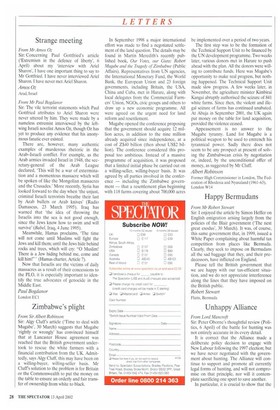Zimbabwe's plight
From Sir Albert Robinson Sir: Algy Cluffs article ('Time to deal with Mugabe', 30 March) suggests that Mugabe 'rightly or wrongly' has convinced himself that at Lancaster House agreement was reached that the British government undertook to rescue the white farmers with a financial contribution from the UK. Admittedly, says Algy Cluff, this may have been on a willing-buyer, willing-seller basis. Mr Cluffs solution to the problem is for Britain or the Commonwealth to put the money on the table to ensure an orderly and fair transfer of ownership from white to black.
In September 1998 a major international effort was made to find a negotiated settlement of the land question. The details may be found in Martin Meredith's recently published book, Our Votes, our Guns: Robert Mugabe and the Tragedy of Zimbabwe (Public Affairs). Representatives from UN agencies, the International Monetary Fund, the World Bank, the European Union and 23 foreign governments, including Britain, the USA, China and Cuba, met in Harare, along with local delegates from the Commercial Farmers' Union, NG0s, civic groups and others to draw up a new economic programme. All were agreed on the urgent need for land reform and resettlement.
Mugabe opened the conference proposing that the government should acquire 12 million acres, in addition to the nine million already acquired since independence, at a cost of Z$40 billion (then about US$2 billion). The conference considered this proposal too ambitious. Instead of a massive programme of acquisition, it was proposed that a limited initial phase be carried out on a willing-seller, willing-buyer basis. It was agreed by all parties involved in the conference — including the Zimbabwe government — that a resettlement plan beginning with 118 farms covering about 700,000 acres be implemented over a period of two years.
The first step was to be the formation of the Technical Support Unit to be financed by the UN development programme. Two weeks later, various donors met in Harare to push ahead with the plan. All the donors were willing to contribute funds. Here was Mugabe's opportunity to make real progress, but nothing happened. The Technical Support Unit made slow progress. A few weeks later, in November, the agriculture minister Kimbirai ICangai abruptly authorised the seizure of 841 white farms. Since then, the violent and illegal seizure of farms has continued unabated. At Abuja in September 2001, the UK again put money on the table for land acquisition, provided the violence ceased.
Appeasement is no answer to the Mugabe tyranny. Land for Mugabe is a political weapon to be used to entrench his tyrannical power. Sadly there does not seem to he any prospect at present of solving the Zimbabwean crisis by negotiation or, indeed, by the unconditional offer of money, as suggested by Mr Cluff.
Albert Robinson
Former High Commissioner in London, The Federation of Rhodesia and Nyasaland (1961-63), London W14


















































































 Previous page
Previous page